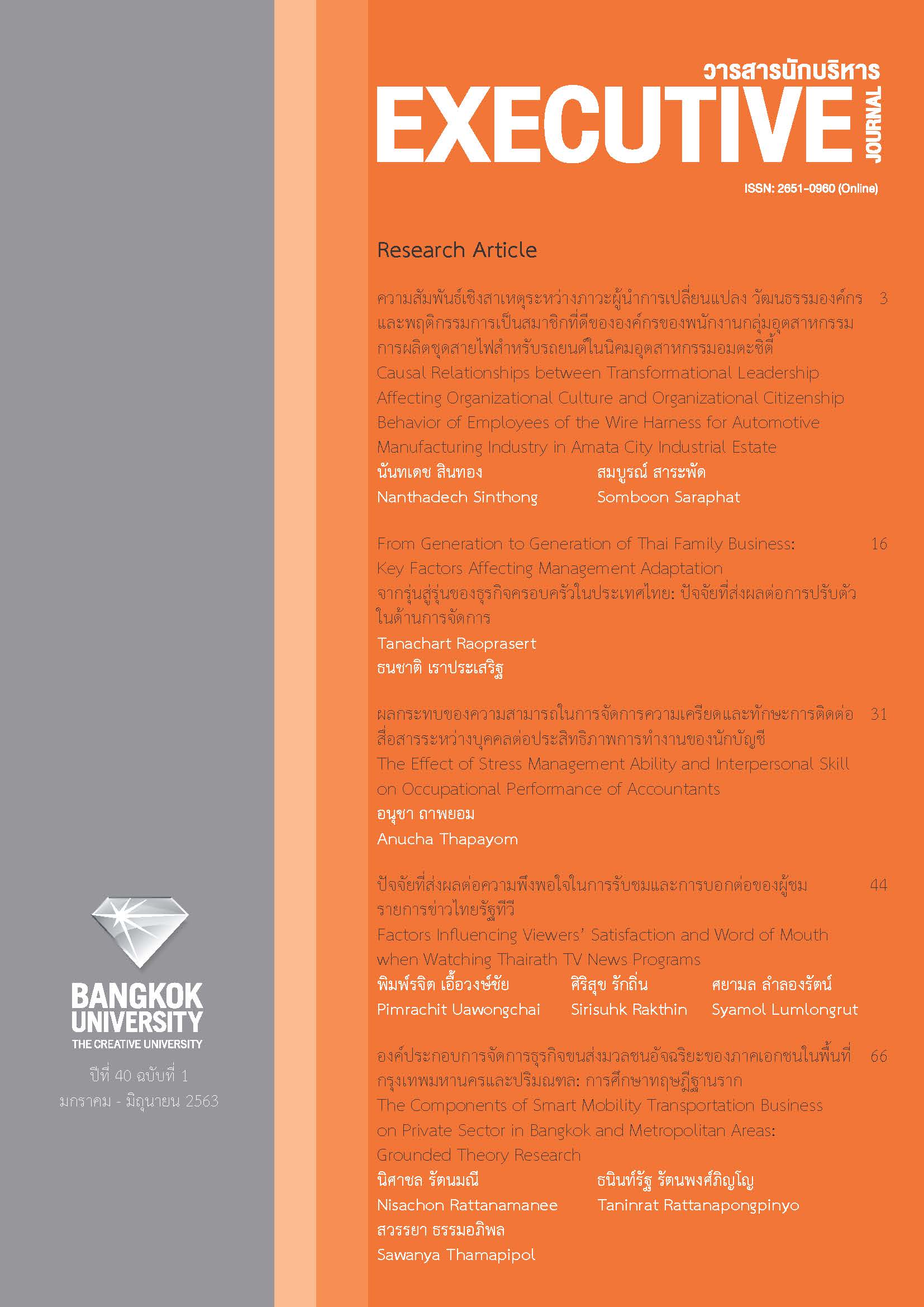The Stakeholders’ Expectation on the Audit Service and Approach for Reduction of Audit Expectation Gap
Main Article Content
Abstract
The objectives of this research are to analyze the perception of auditors and users of financial statements about auditor’s attributes, auditing report, and financial report; to study the guidelines of gap reduction regarding expectation among the users of financial statements on auditing; to analyze the differences of expectations between auditors and users of the financial statements on the auditing; and to analyze the expectations of auditors and users of financial statements that affect auditor’s attributes, auditing report, and financial report. The sample consisted of 1,037 auditors, business executives and bank credit departments’ officers. Data were collected using a questionnaire, and were analyzed using percentage, mean, standard deviation and analysis of variance, as well as the analysis of multinomial logistic regression: MLR analysis for hypothesis testing.
The research found that the expectations on the auditing were significantly different at the level of 0.05 among 1) auditors, establishments, and bank credit departments’ officers, 2) auditors and establishments, 3) auditors and bank credit departments’ officers, and 4) bank credit departments’ officers and establishments. In addition, it was found that the expectations towards the auditing of the establishment auditors and the bank credit department does not affect the characteristics of the auditor, auditing report, and financial report.
Finally, reduction of the audit expectation gap, users of all financial statements must understand the auditor's role and their duties as well as raise the standards for the operating control of the auditors in the auditing standards.
Article Details
The manuscript submitted for publication must be the original version, submitted only to this particular journal with no prior acceptance for publication elsewhere in other academic journals. The manuscript must also not violate the copyright issue by means of plagiarism.
References
Bektasevic, A. (2019). The expectations of audit: A qualitative study on smaller limited firms in Sweden (Master’s thesis, Uppsala University).
Brooks, M. R. (2014). Essays examining the association between going concern audit opinions, subsequent earnings management and engagement office audit and reporting quality (Doctoral dissertation, University of Texas at San Antonio).
Coffey, A. P. (2012). Exploring stakeholder alignment within the requirements planning phase of business integration projects (Doctoral dissertation, Walden University).
Daud, Z. M. (2007). The study of the audit expectations gap in the public sector of Malaysia (Phd thesis, University of Stirling).
Dibia, N. O. (2015). Audit expectations gap and perception of financial reporting. International Journal of Managerial Studies and Research, 3(3), 23-31.
Ennis, R. H. (2015). Critical thinking: A streamlined conception. In M. Davies, & R. Barnett (Eds.), The palgrave handbook of critical thinking in higher education (pp. 31-47). New York, NY: Palgrave Macmillan.
Henchokchaichana, N., & Srichunpet, S. (2014). Kān sō̜p banchī læ kānhai khwāmchư̄aman [Auditing and assurance]. Bangkok: T.P.N. Press.
Humphrey, C. (1997). Debating audit expectations. In M. Sherer, & W. S. Turley (Eds.), Current issues in auditing (3rd ed., pp. 3-30). London: Paul Chapman.
Humphrey, C. G. Moizer, P., & Turley, W. S. (1993). The audit expectation gap in Britain: An empirical investigation. Accounting and Business Research, 23(suppl 1), 395-411.
Iskander, A. E. (2008). The relationship between auditing expectations gap and voluntary corporate disclosure: Egyptian evidence (Doctoral thesis, University of Durham).
Madsen, P. (2013). Commercial loan officers and the audit expectation gap (Master’s thesis, Uppsala University).
McNellis, C. J. (2011). The impact of inconsistent evidence documentation on third-party perceptions of audit quality and judgments of auditor liability: An examination of the effectiveness of AS3 documentation expectations in audit litigation (Doctoral dissertation, Washington State University).
Phop lakthān mai "mō̜ Wichai" tham philưk wan phū sō̜p banchī mai klā raprō̜ng [Found new evidence "Dr. Wichai" made strange, the auditors did not dare to certifying]. (2017, 3 April). Bangkok Biz News. Retrieved February 19, 2018, from https://www.bangkokbiznews.com/news/detail/748571
Samira, A. (2013). The development of auditing and the possible existence of an expectation gap in Libya (Doctoral thesis, University of Huddersfield).
Stikeleather, J. A. (2017). Toward a systemic model for governance and strategic management: Evaluating stakeholder theory versus shareholder theory approaches (Doctoral dissertation, University of South Florida).
Yamane, T. (1973). Statistics: An introductory analysis (2nd ed.). New York: Harper & Row.
Yi, Z. (2007). CPA’s Auditing responsibility (Master’s thesis, Sichuan University).


